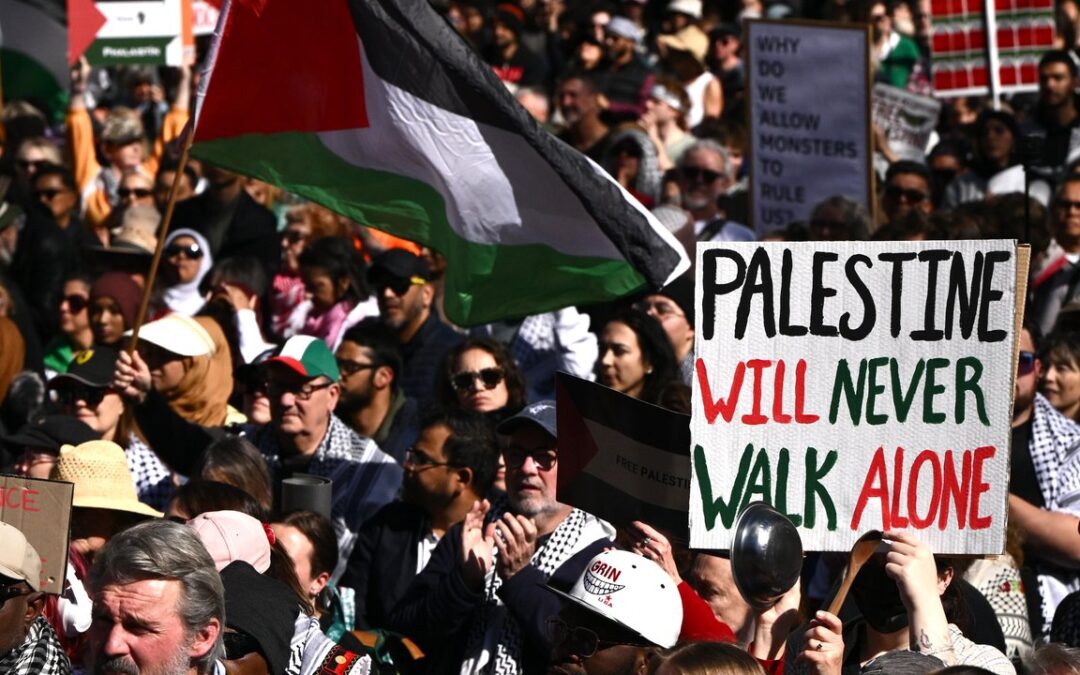
Rallies under way as Palestine support swells
Hundreds of thousands of people have gathered across dozens of Australian cities and towns, marching in a nationwide groundswell of support for the Palestinian cause, days after famine was declared in Gaza for the first time.
Marchers, backed by more than 250 community organisations, unions and prominent public figures turned up at rallies in more than 40 cities on Sunday to demand sanctions and an end to Australia’s arms trade with Israel.
“The movement is the biggest it’s ever been,” Palestine Action Group’s Sydney spokesman Josh Lees told AAP.
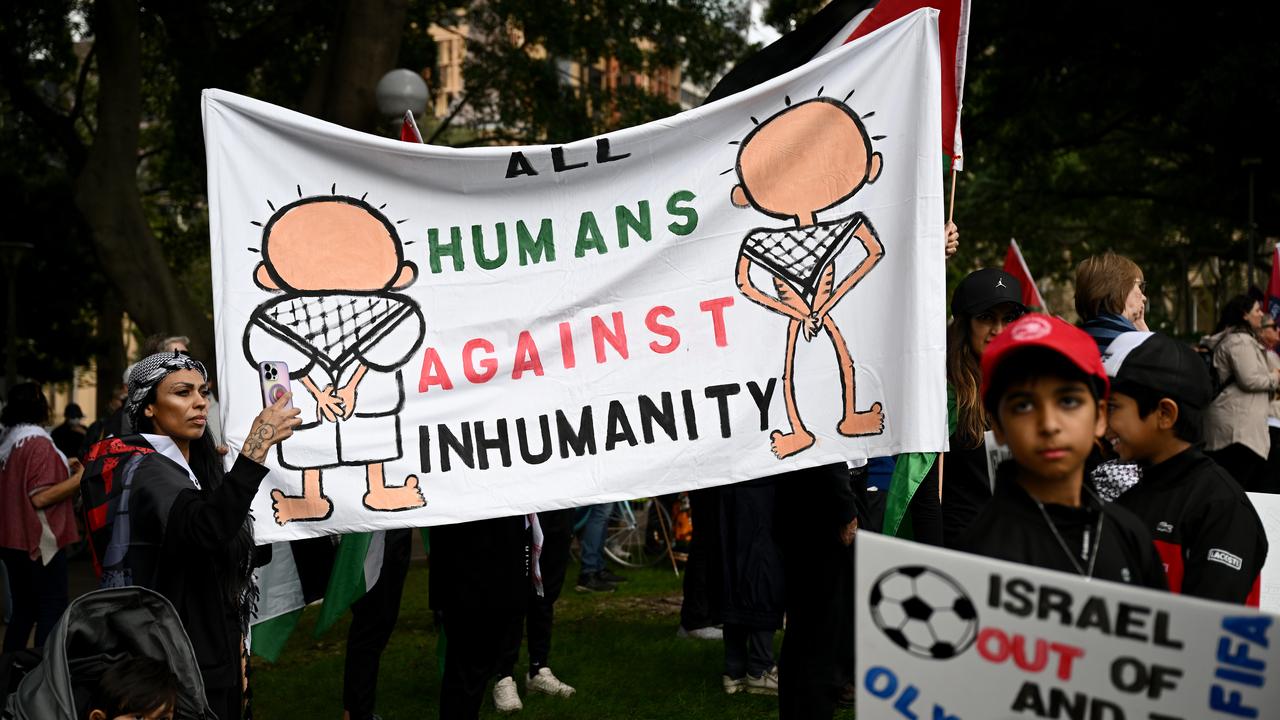
Organisers anticipate up to half a million people to turn out by the day’s end, backing up the estimated 300,000 that attended the Sydney Harbor Bridge march in early August, which they say was a reflection of the huge outpouring of support for Palestinians.
“That bridge march has generated so much momentum around the country,” Mr Lees said.
“The dam has burst in terms of support for Palestine and opposition to this genocide.”
The action comes days after the United Nations confirmed famine in parts of the Gaza Strip for the first time, as Israel prepares for a military takeover of the entire city.
“It adds even more to the urgency of why we need to mobilise to demand our government takes real action to stop this,” Mr Lees said.
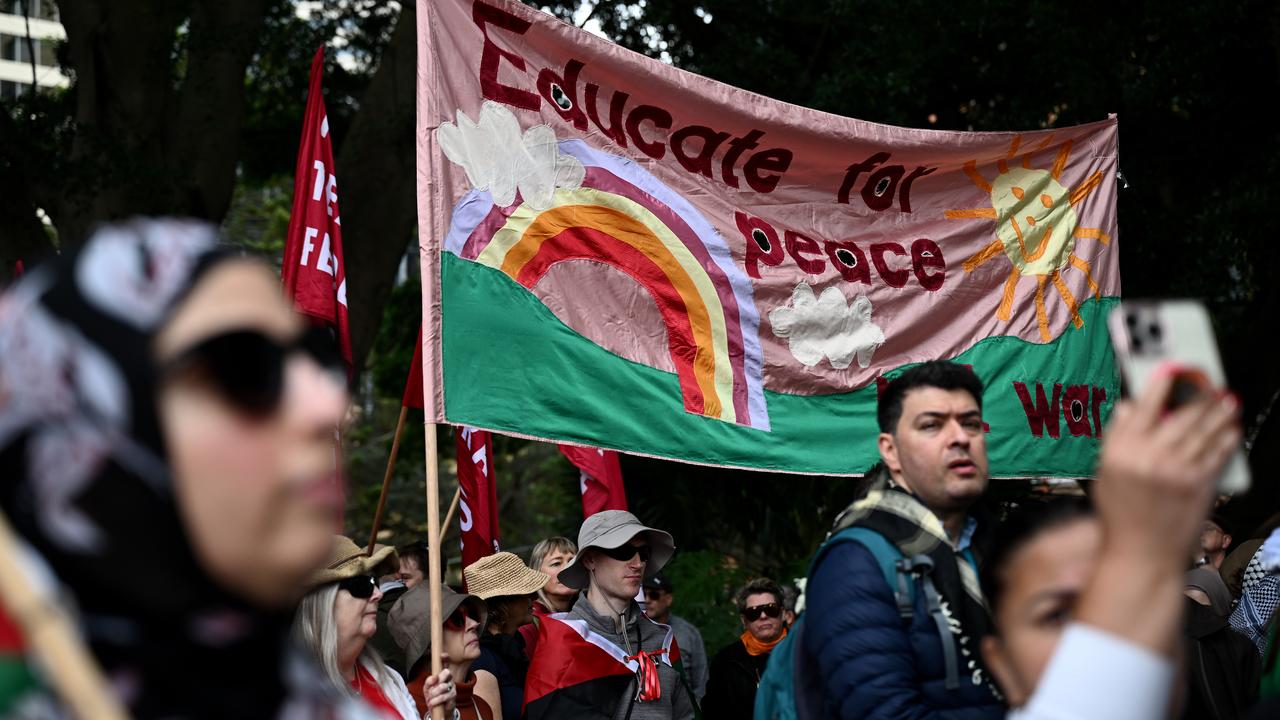
More than 60,000 Palestinians have been killed including 18,000 children since October 7, 2023, when Hamas killed 1200 people and took more than 200 hostages at an Israeli music festival, according to the United Nations.
Speakers slated to address crowds include high-profile activist Grace Tame and journalist Antoinette Lattouf.
The push for change comes after a magistrate vetoed plans by organisers to march across Brisbane’s Story Bridge, which Queensland Police Acting Assistant Commissioner Rhys Wildman welcomed but said could have been resolved weeks ago.
About 7000 gathered at Queens Gardens with speeches kicking off just after 1pm.
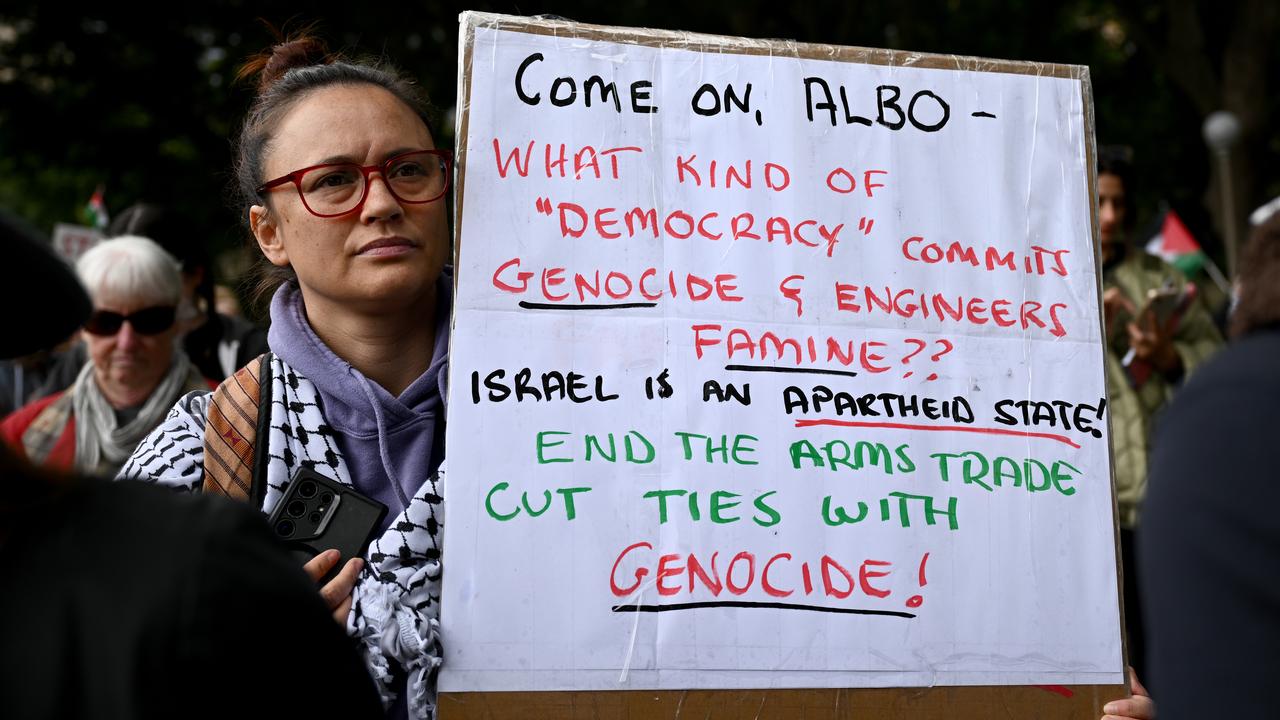
A larger turnout congregated just before midday outside Victoria’s State Library in Melbourne calling for sanctions and holding placards that read “Israel is killing children”.
Protests are also taking place in Canberra, Adelaide, Perth and Darwin, as well as in regional cities, including Warrnambool and Geelong.
Israel has rejected criticism that its actions in Gaza amount to genocide, a claim that has also been brought against it before the International Court of Justice. Its Prime Minister Benjamin Netanyahu called the famine declaration an “outright lie”.
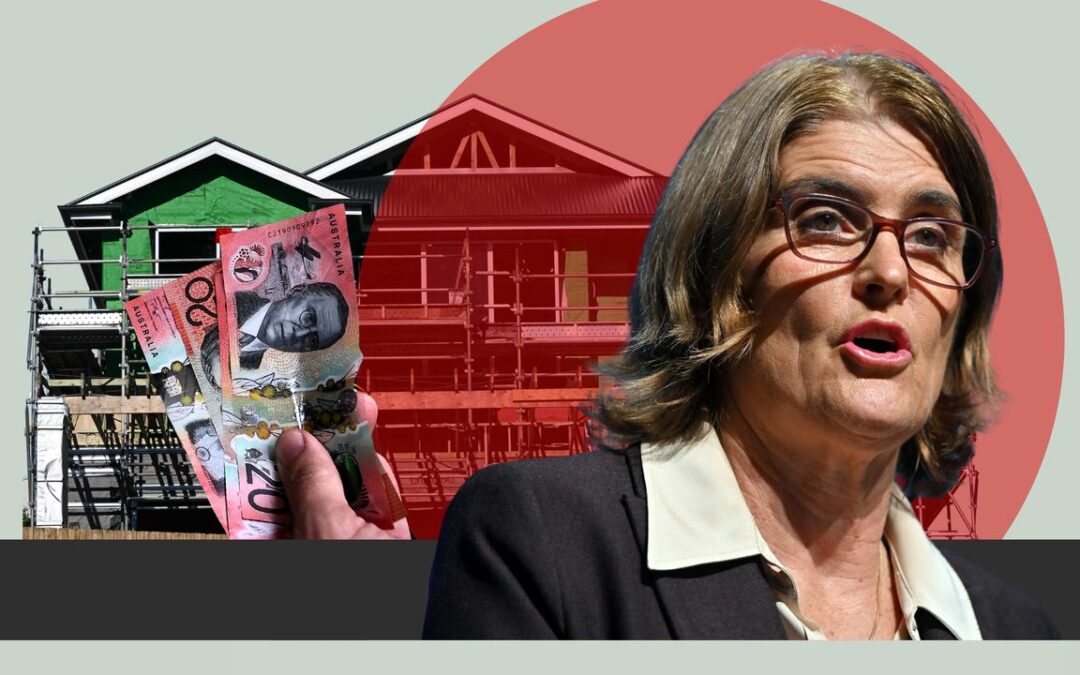
Inflation update to shape further rate cut expectations
The first inflation report since the Reserve Bank of Australia’s latest interest rate cut will give an early indicator of whether borrowers can expect back-to-back relief.
The Australian Bureau of Statistics will release monthly inflation figures for July on Wednesday.
While the central bank places less emphasis on the narrower monthly data series than the more comprehensive quarterly release, it will still provide an indication of the direction of travel.
The consumer price index fell below the RBA’s two to three per cent target band in the previous month’s figures but analysts expect the headline figure to rebound given a rise in fuel prices in July.
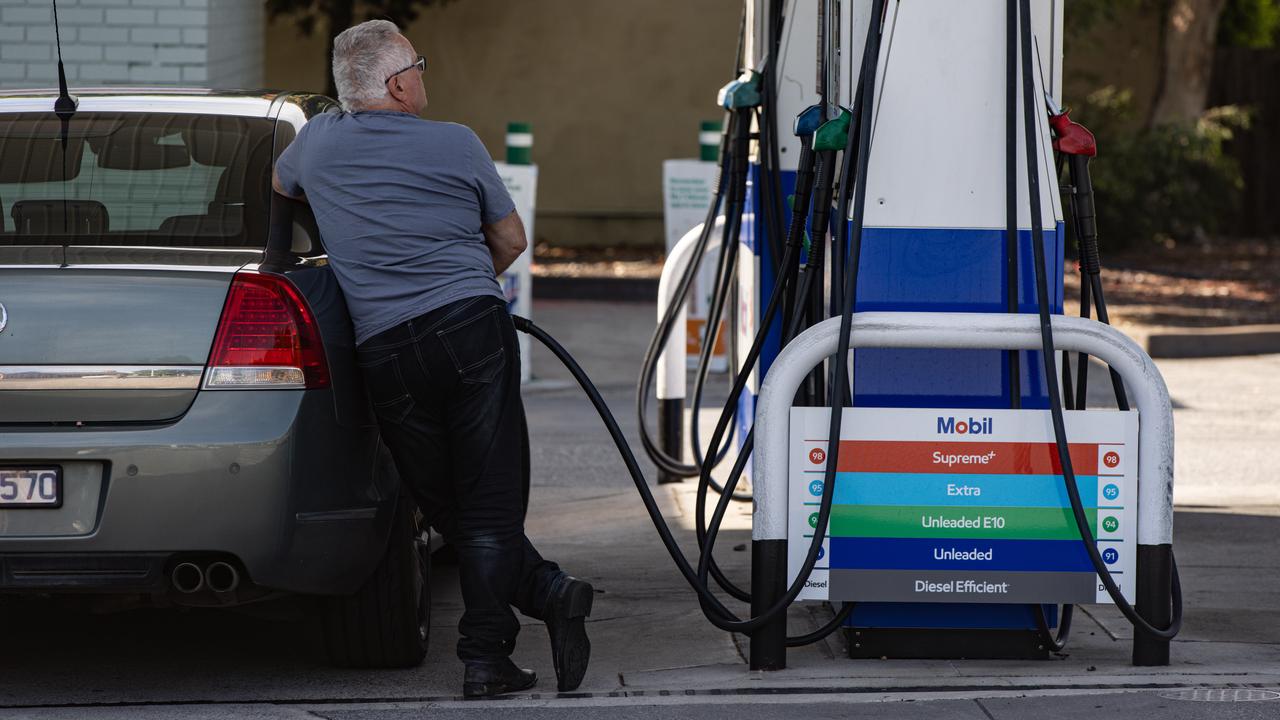
“We expect to see there was a slight rise in annual inflation in the monthly CPI Indicator from 1.9 per cent year-on-year in June to 2.0 per cent year-on-year in July,” ANZ economist Adelaide Timbrell said.
But the predicted inflation excluding holidays and volatile items would ease from 2.5 per cent to 2.3 per cent; a further sign that inflation continues to fall sustainably as the RBA expects.
Despite the continued moderation in price growth, traders are pessimistic about the bank’s September rates meeting, with money markets pricing in less than one-third chance of another 25 basis point reduction.
Minutes from the RBA board’s last meeting, to be released on Tuesday, should provide more insight into the reasons behind its decision.
Governor Michele Bullock revealed the board was increasingly confident inflation was under control and felt the labour market was perhaps a little less tight than before in her post-meeting press conference.
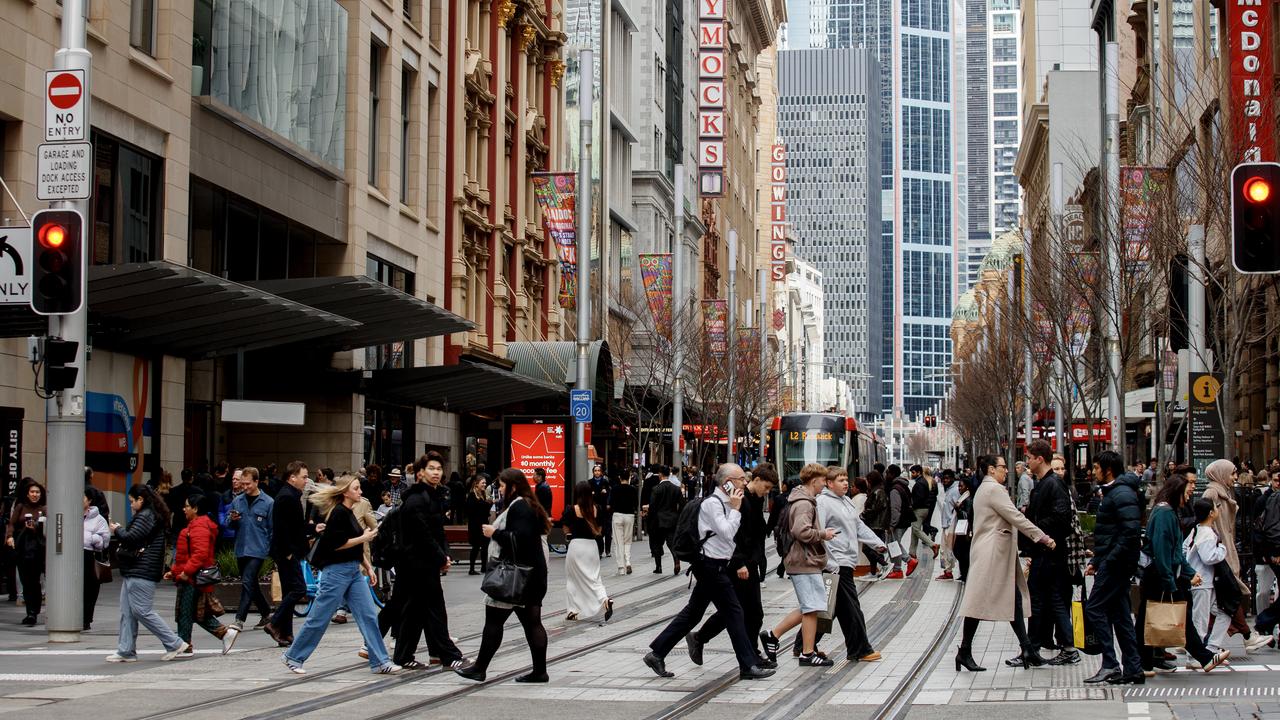
Any further information about how tight the board considered the jobs market to be or how close the cash rate was to neutral, would be of interest, said ANZ economists in a research note.
Also of note in the economic sphere this week are ABS updates on construction work and capital expenditure, which have been subdued in recent months.
Meanwhile Wall Street investors have piled into stocks on the back of a hinted near-term rate cut.
The blue-chip Dow Jones Industrial Average hit a record closing high on Friday, with comments by Federal Reserve Chair Jerome Powell paving the way for a potential cut in September, although he stressed the importance of jobs and inflation data due before then.
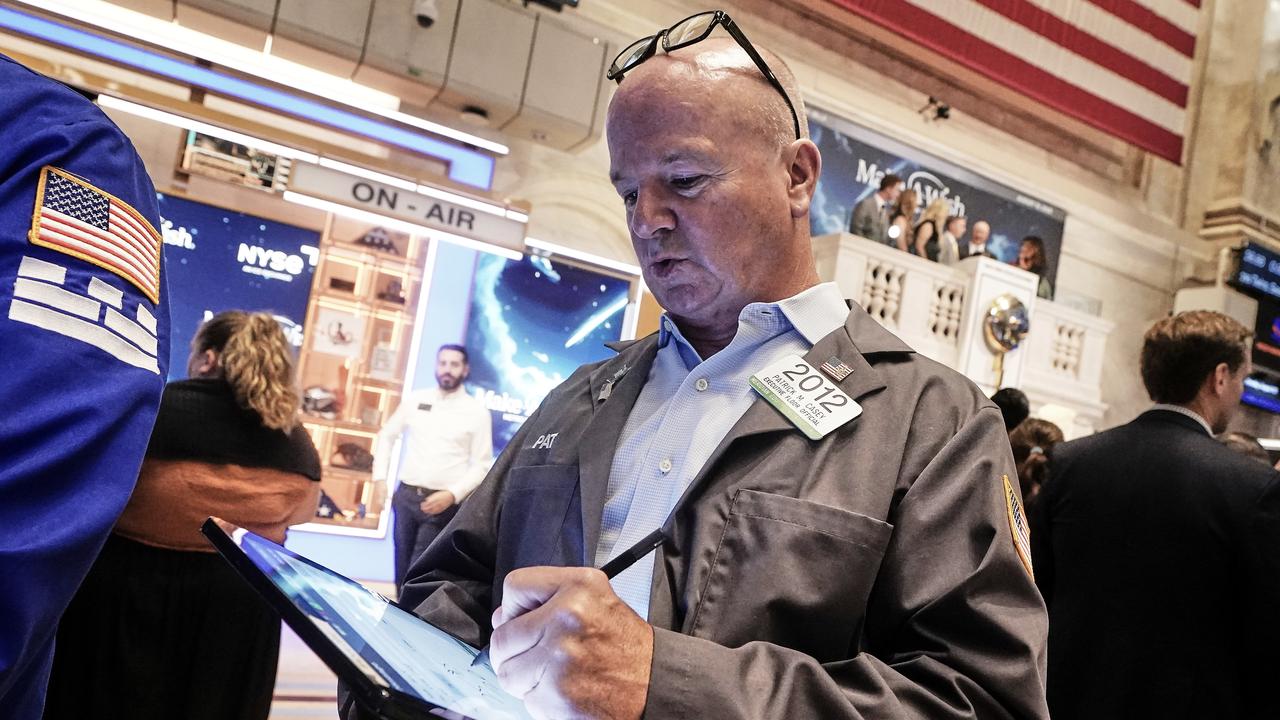
The Dow rose 841.14 points, or 1.88 per cent, to 45,626.64, as the S&P 500 gained 96.73 points, or 1.52 per cent, to end at 6,466.55 points and the Nasdaq Composite gained 396.22 points, or 1.88 per cent, to 21,496.54.
Australian share futures climbed 84 points, or 0.94 per cent, to 10,319.
The S&P/ASX200 lost 51.7 points, or 0.57 per cent, to 8,967.4 on Friday, while the broader All Ordinaries shed 49.9 points, or 0.54 per cent, to 9,234.3.
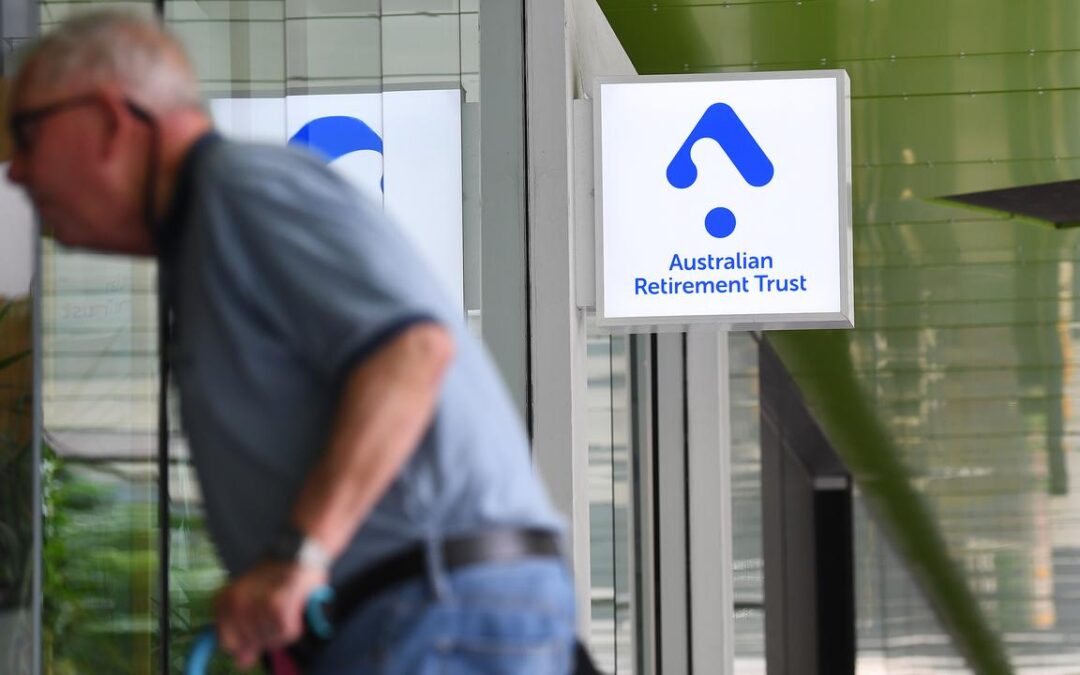
Tax perks on super for retirees ‘deserved’: treasurer
Retirees still deserve concessional treatment on their superannuation, the treasurer says, despite mounting calls for an overhaul of the tax system.
Jim Chalmers said fairness for younger generations needed to be considered as part of any change to taxes, following talks at the three-day productivity roundtable in Canberra.
While he said calls for tax reform at the summit would inform upcoming federal budgets, he said there was no plan to alter concessional tax measures for retirees on their super balances.
“They still deserve concessional treatment to encourage people to be in superannuation, and that’s not something that we have been proposing to change,” Dr Chalmers told ABC’s Insiders program on Sunday.
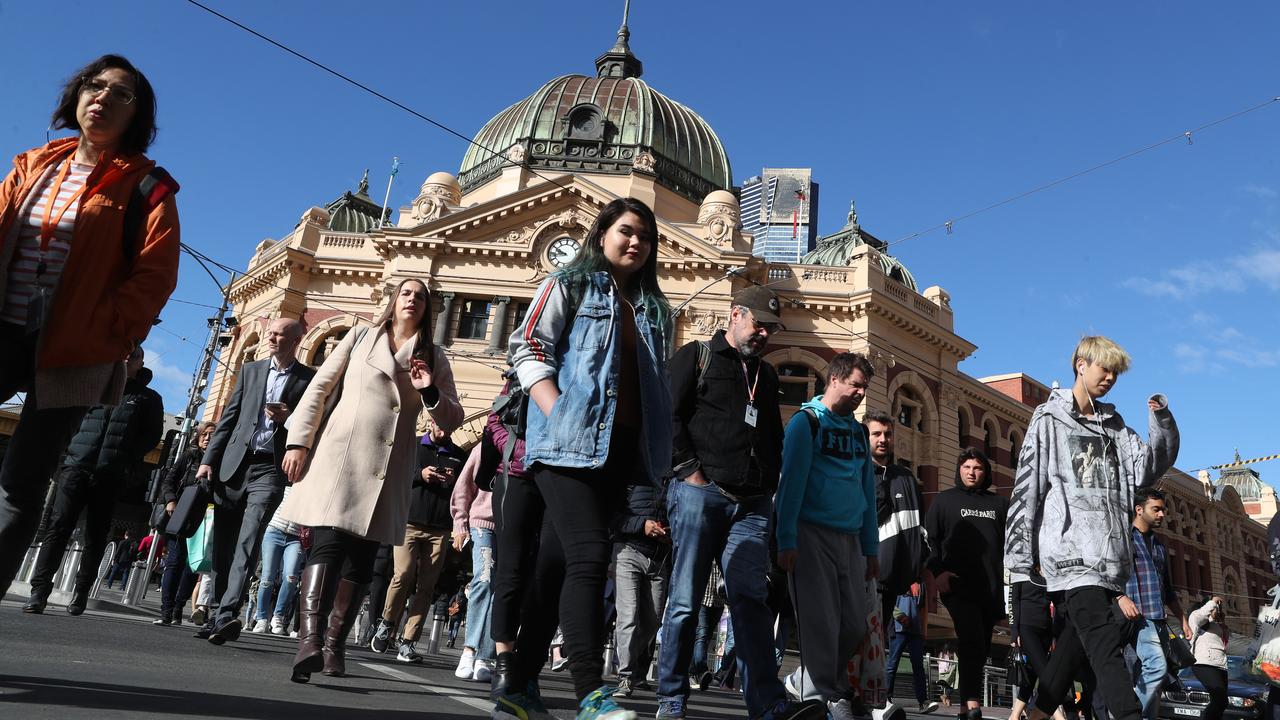
“We need to ensure, collectively as Australians, that the fair go is the defining part of our future and not just the defining part of our past.”
Ahead of the summit, there were calls for attendees to consider changes to capital gains tax and negative gearing, as well as an overhaul of the GST.
While the treasurer said intergenerational fairness would be central to any changes, there would not be a rush on implementing reform.
“The best way to work out any additional steps beyond that is to do that in the government’s usual consultative and considered way, which is what we’re doing,” he said.
“We didn’t, at the conclusion of the roundtable, rewrite our policies in those areas. More broadly, intergenerational equity has been a motivation for so much of what we’re already doing in tax.”
The treasurer also confirmed proposed changes to tax on super balances over $3 million, would not be brought to parliament in the upcoming sitting fortnight, but would be brought in eventually.
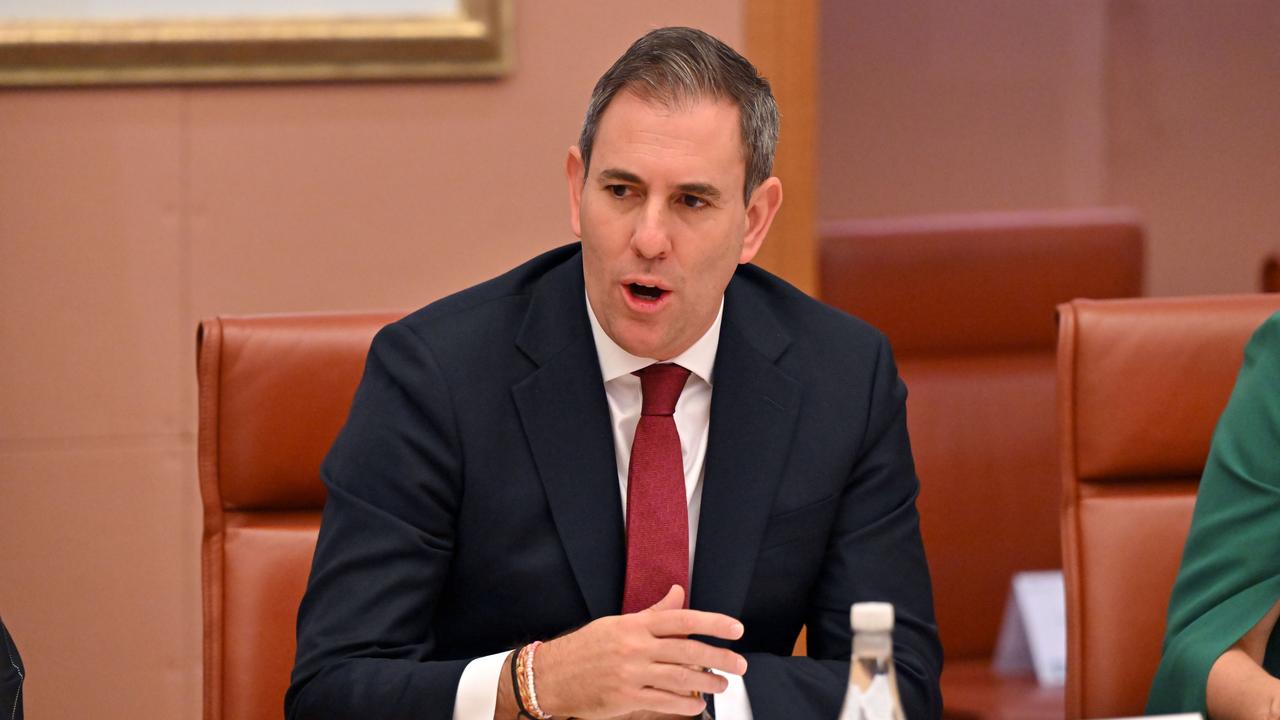
“I proposed what is a pretty modest change, but a meaningful change which makes the system a bit more sustainable,” Dr Chalmers said.
“It doesn’t begin to be calculated until the second half of next year, and so we’ve got time to reintroduce that.”
While there was support at the economic summit for a road user charge for electric vehicle drivers, the treasurer said those who have petrol cars would not be double taxed for the measure.
It comes as shadow treasurer Ted O’Brien admitted the coalition got its tax position wrong ahead of the May federal election, when the opposition opposed broad tax cuts.
But he said he would not be surprised if the government introduced a raft of additional taxes.
“If you just keep on spending, you’ve got to get the money from somewhere,” he told Sky News.
“When you can’t control your spending, you’re just going to increase debt and increase taxes. That’s pretty clear.”
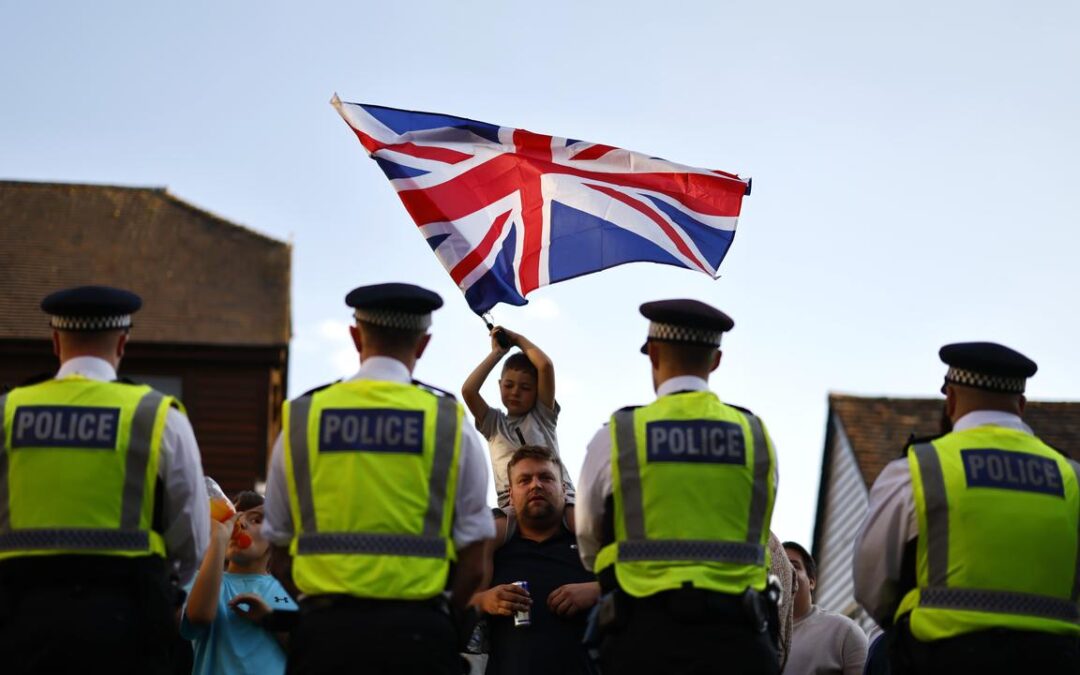
Clashes as asylum protests take place across the UK
Police and protesters have scuffled as demonstrations against hotels housing asylum seekers took place across the UK.
Demonstrations under the Abolish Asylum System slogan were held in major towns and cities around England, including Bristol, Exeter, Tamworth, Cannock, Nuneaton, Liverpool, Wakefield, Newcastle, Horley in Surrey and Canary Wharf in central London.
Aberdeen and Perth in Scotland and Mold in Flintshire, Wales, also held protests.
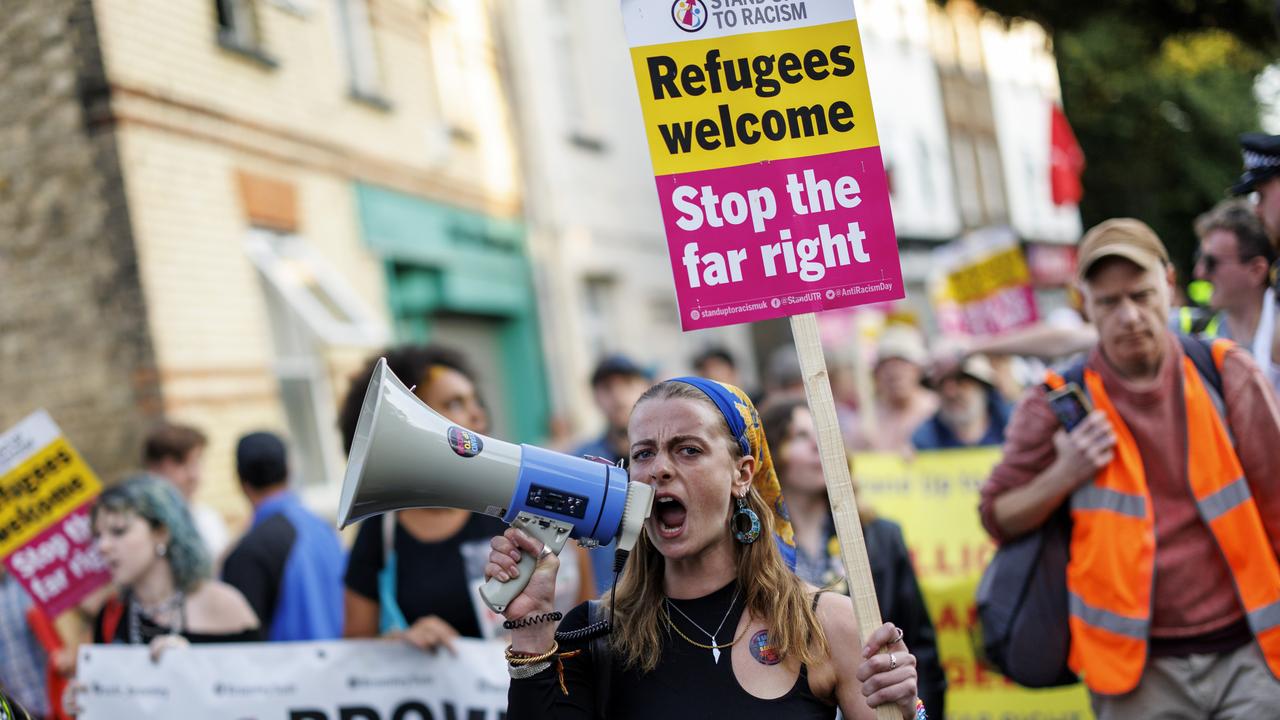
A separate batch of protests were organised by Stand Up to Racism in Bristol, Cannock, Leicester, Liverpool, Newcastle, Wakefield, Horley and Long Eaton in Derbyshire.
In Bristol, mounted police were brought in to separate rival groups in the Castle Park, with officers scuffling with protesters.
A 37-year-old woman has been arrested on suspicion of assaulting an emergency worker.
Avon and Somerset Police said no officer sustained serious physical injury or required hospital treatment, but enquiries will be carried out after reports of assaults on officers.
“Our priority today has been to enable lawful peaceful protest for both groups,” Chief Inspector Keith Smith said.
“While there were moments of disturbance, we’re pleased to say the two protests have passed without significant incident.”
In Liverpool, there were 11 arrests for offences including being drunk and disorderly, assault and affray, as a UK Independence Party protest was met by a counter-demonstration.
In Horley, around 200 anti-immigration protesters draped in St George and Union flags clashed with roughly 50 Stand Up to Racism protesters in Bonehurst Road.
The anti-racism protesters chanted, “Say it loud, say it clear, refugees are welcome here.”
They were met with a torrent of abuse from the anti-migration group, one of whom yelled through a megaphone, “You’re all scum and you should be ashamed”, and “This wasn’t about racism”.
The two groups almost came together in the early afternoon, with lines of police separating them.
The Stand Up to Racism protesters were shepherded into a smaller area as they continued to chant “No hate, no fear, refugees are welcome here”, which was met with “No, they’re f***** not” from the other side of the street.
Saturday’s events come amid continued tension around the use of the hotels for asylum seekers.
On Tuesday, the High Court granted Epping Forest District Council a temporary injunction to remove asylum seekers from the Bell Hotel in Epping, Essex, from September 12.
Regular protests had been held outside the hotel in recent weeks after an asylum seeker was charged with trying to kiss a 14-year-old girl, which he denies.
The government announced plans on Friday to appeal against the High Court’s refusal to allow it to intervene in the case and to further appeal against the temporary injunction.
Other local councils also publicly announced their intention to seek legal advice as to whether they could achieve a similar injunction for hotels in their areas.
Reform UK’s Nigel Farage has set out plans for mass deportations if he becomes prime minister.
Arresting asylum seekers on arrival, automatic detention and forced deportation to countries such as Afghanistan and Eritrea are among the proposals reported to be announced on Tuesday.
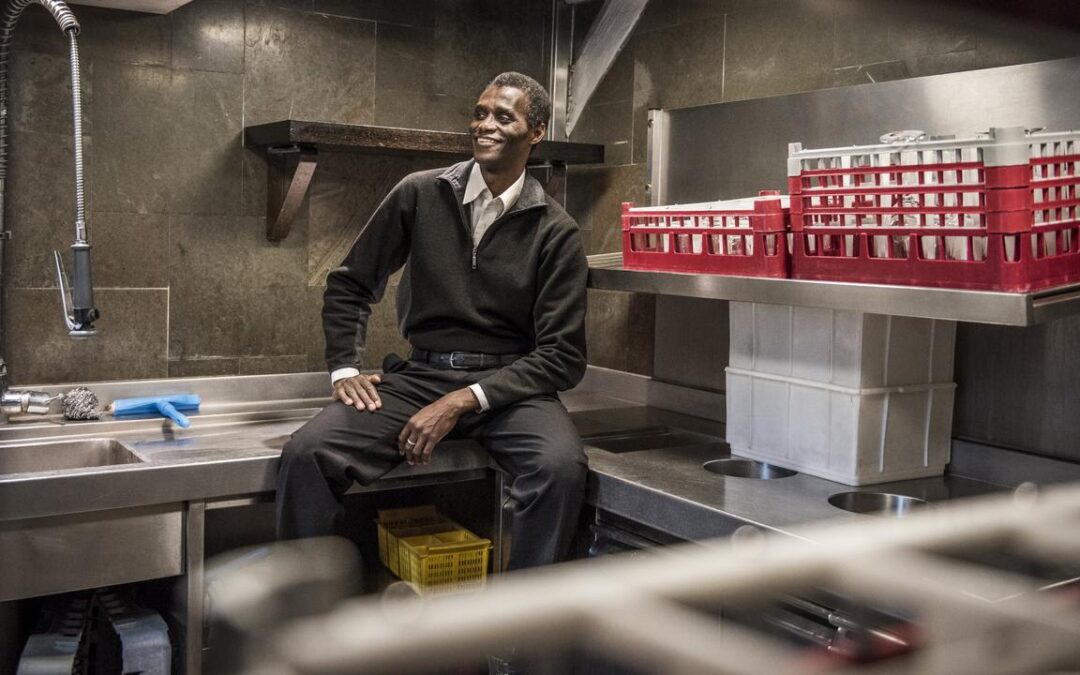
Foreign workers have boosted euro zone economy
An influx of foreign workers has given the euro zone’s economy a boost in recent years, helping offset shorter working hours and lower real wages, European Central Bank President Christine Lagarde says.
Migration into the European Union pushed its population to a record last year despite declining births.
But some governments are placing curbs on new arrivals in response to domestic discontent.
Lagarde listed a rise in the number of workers from outside the 20 countries that share the euro as a factor that supported the bloc’s economy despite a growing preference for fewer working hours and a fall in living standards in some sectors.
“Although they represented only around nine per cent of the total labour force in 2022, foreign workers have accounted for half of its growth over the past three years,” Lagarde said in a speech at the US Federal Reserve’s annual symposium in Jackson Hole, Wyoming.
“Without this contribution, labour market conditions could be tighter and output lower.”
She said gross domestic output in Germany would be around six per cent lower than in 2019 without foreign workers and added Spain’s strong economic performance since the end of the COVID-19 pandemic also owed much to the contribution of foreign labour.
The EU’s population rose to a record 450.4 million people last year as net immigration offset a natural population decline for the fourth straight year.
But this has come at a cost of political backlash from local voters, who have increasingly turned to far-right parties.
Germany’s new government, for example, has suspended family reunification and resettlement programs as it seeks to regain support from voters drawn to the Alternative for Germany.
In the United States, President Donald Trump has stepped up arrests of immigrants in the US illegally, cracked down on unlawful border crossings and stripped legal status from hundreds of thousands of migrants since his inauguration.
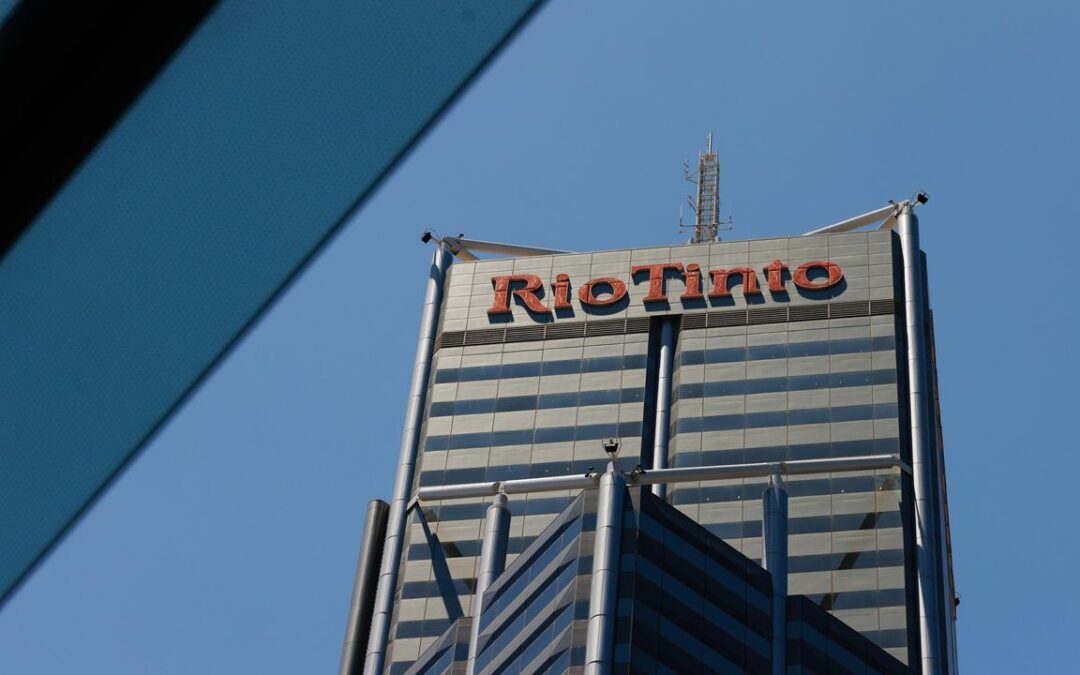
Contract worker dies at Rio Tinto mine in Guinea
A contract worker has died following an incident in Rio Tinto’s SimFer mine site in Guinea, the British-Australian multinational mining company says.
All activity at the SimFer mine site is suspended, the iron ore miner said in its statement on Saturday.
Incoming chief executive Simon Trott said he will be travelling to Guinea to spend time with the team there.
“It is devastating to lose a colleague in this way,” he said.
“We will continue to do everything we can to ensure the safest possible work environment where everyone goes home safely to their family after every shift.”
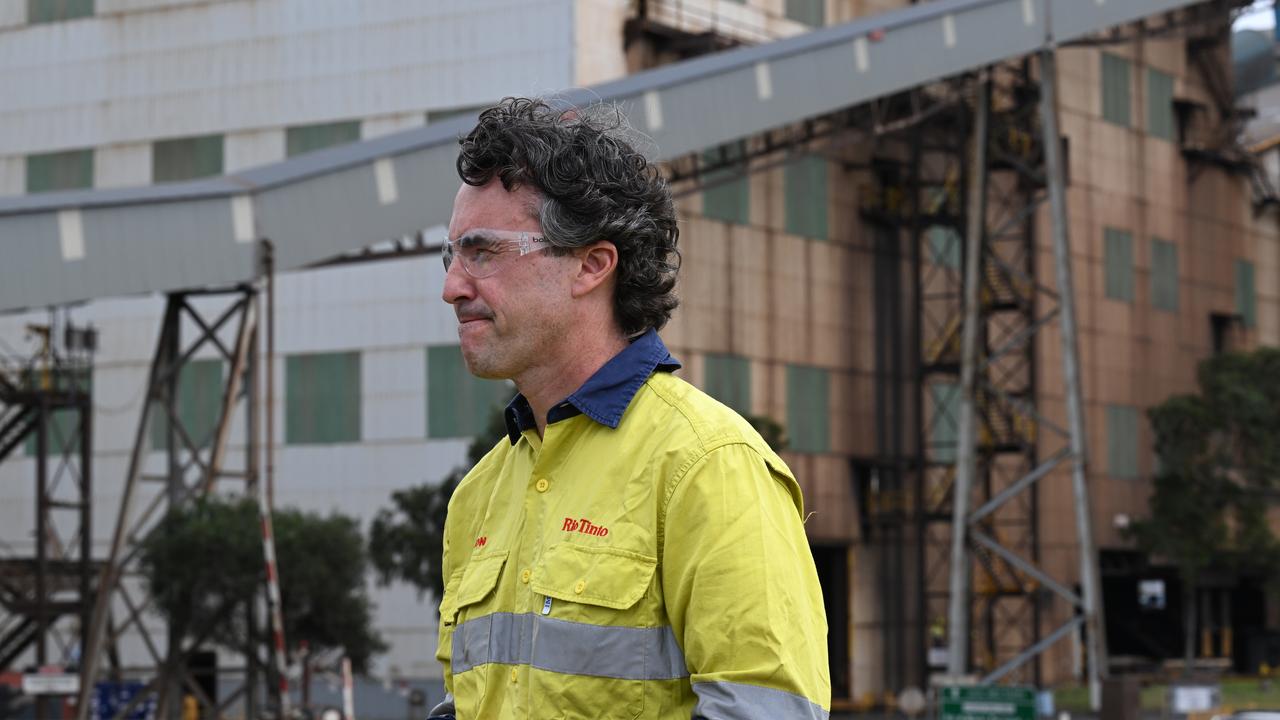
Outgoing boss Jakob Stausholm flagged that a thorough investigation will take place.
“We extend our deepest condolences to the family, friends and colleagues impacted by this tragic event as well as the wider community,” he said.
The incident follows another worker’s death in Guinea at a port site in October last year.
SimFer is part of Rio Tinto’s Simandou project, which is Africa’s largest mining and infrastructure project.
It is developing the project at the Simandou mountain range, which lies in the country’s south-east and has a surface area of more than 100km.
The subsoil contains high-grade iron ore estimated at around 1.5 billion tonnes, according to the company’s website.
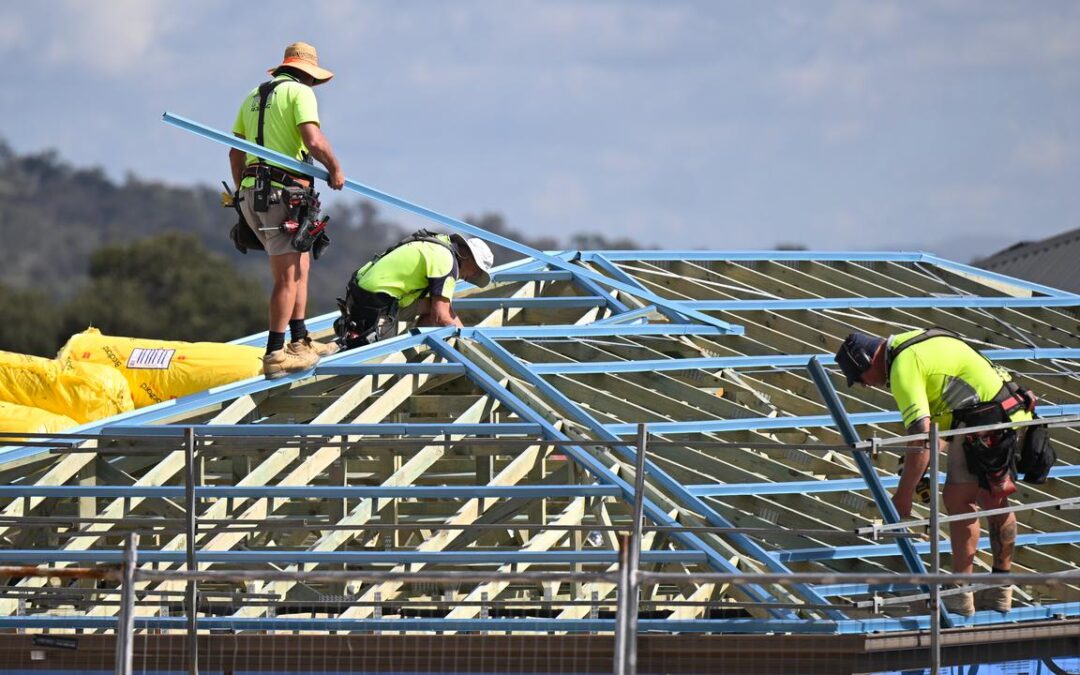
Building standards frozen under housing speed-up plan
The federal government says it has the balance right between sustainability and energy standards and removing red tape to speed up building approvals.
A suite of changes to construction guidelines aimed at reducing delays comes after Treasurer Jim Chalmers confirmed alterations to the national code at the conclusion to last week’s productivity summit.
Under the plan, updates to the 2000-page construction code will be frozen until mid-2029 once the 2025 changes are finalised. The code normally updates every three years.
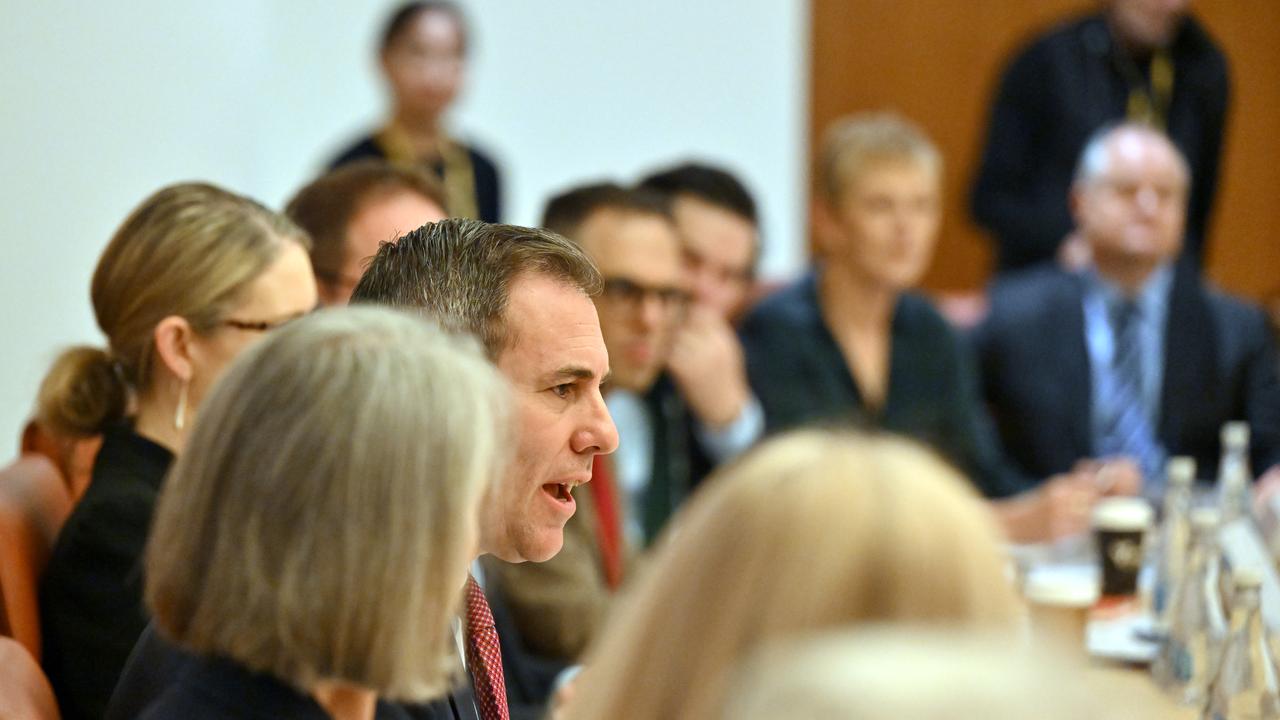
The freeze excludes essential safety and quality changes and maintains the strong residential standards adopted in 2022, including 7-star energy efficiency.
The government will use the pause to streamline the code, including improving its usability with artificial intelligence, removing barriers and encouraging modern methods of construction, such as prefab and modular housing, and improving how code additions are developed.
Removing building red tape to speed up housing construction won’t cut corners on standards, Housing Minister Clare O’Neil said.
“It’s too hard to build a home in this country. We want builders on site, not filling in forms to get their approval,” she said.
The government will also fast-track environmental assessment applications for more than 26,000 homes by creating a specialised environment department team, prioritising robust development applications and looking to use AI tools to simplify and hasten approvals.
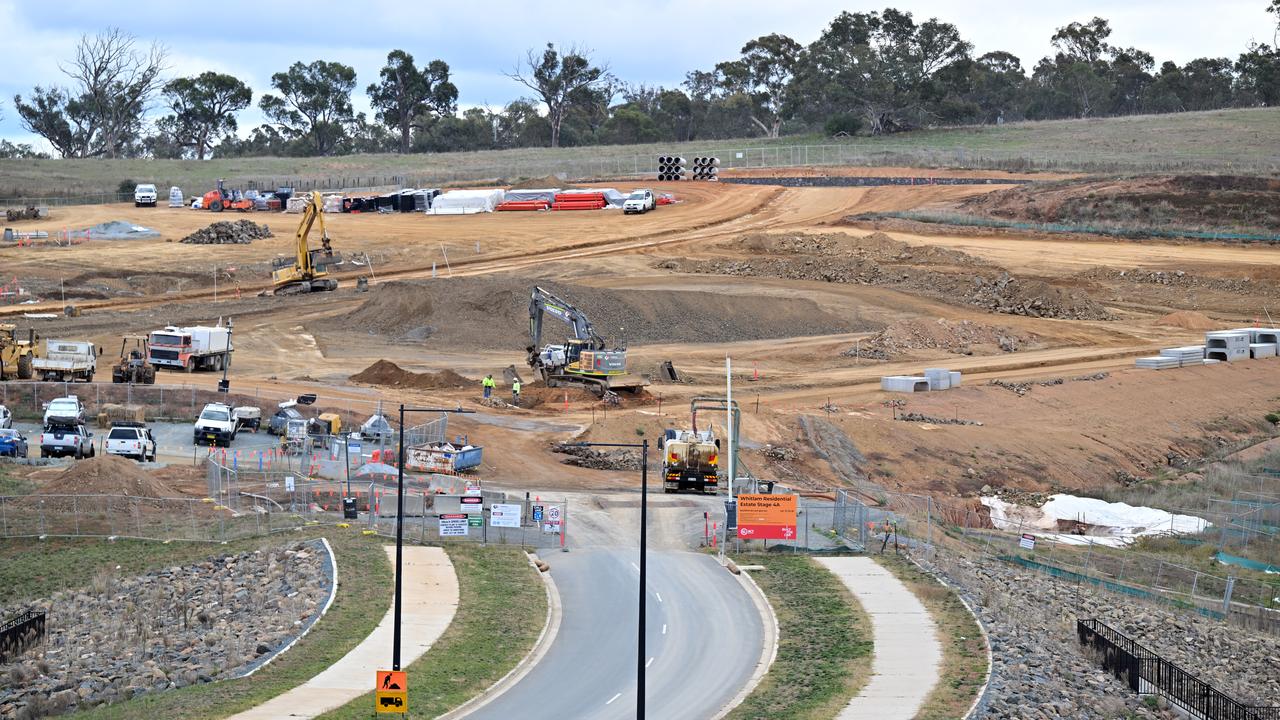
Environment Minister Murray Watt said fast-tracked projects will still need to meet all environmental requirements, but developers will be incentivised to provide required information up front.
“This approach will ensure strong national environmental protections, while also leading to faster decision making, more certainty for industry and more homes for Australians,” he said.
Removing impediments for superannuation investment in new housing and working with the states and territories to accelerate planning, zoning and approvals are also slated under the changes.
At the government’s Economic Reform Roundtable in Canberra last week, a simplification and tidy-up of the code attracted broad support, with few disputing the need for standards that work together better and are easier to navigate.
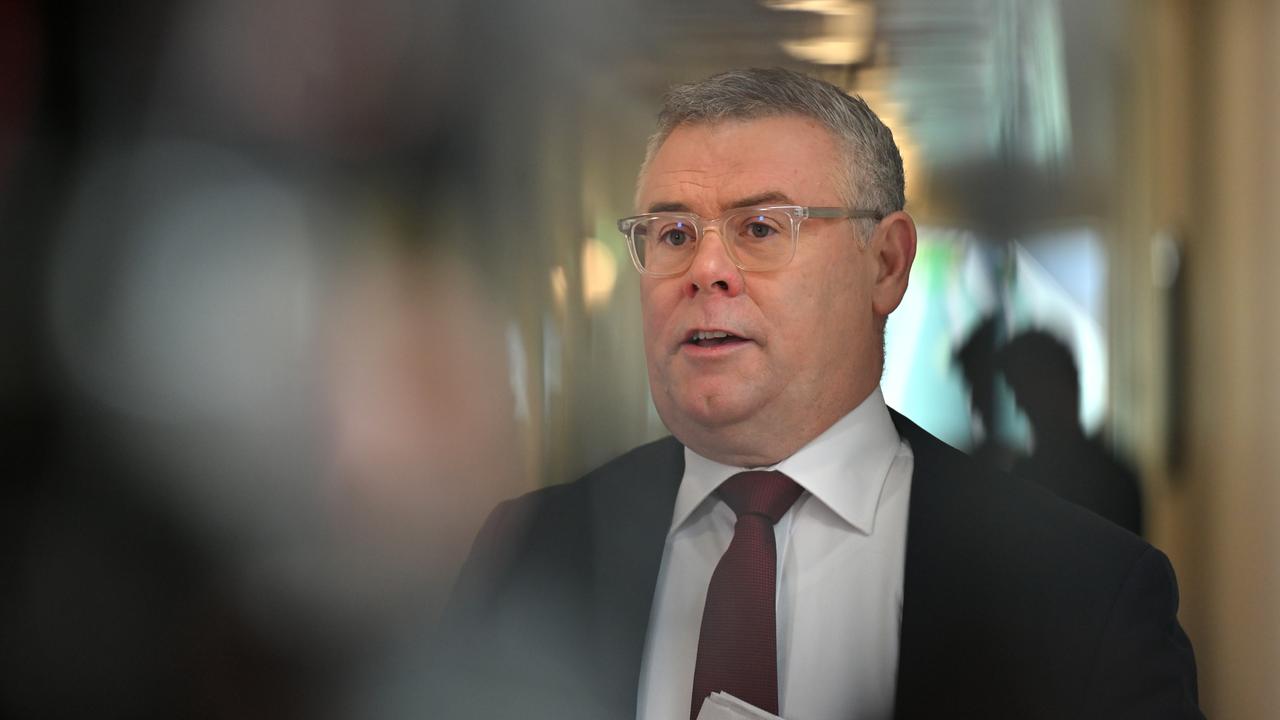
As a “floor” for quality and performance, some saw it as a necessary tool to keep the next generation of homes safe, comfortable and not wasting energy.
The Property Council of Australia’s Mike Zorbas said the measures will help unlock tens of thousands of new homes while ensuring a regular improvement cycle for vital safety and sustainable upgrades to housing.
“The necessary residential code recalibration will achieve the national consistency we all know is the key to an efficient housing production pipeline,” he said.
Master Builders Australia chief executive Denita Wawn applauded the government, saying the constant churn of regulatory change had added pressure to a complex and costly system.
Australian Council of Social Service chief executive Cassandra Goldie, at the summit, warned a construction code freeze could mean households least able to afford home retrofits for a changing climate and energy future could lose out if reforms miss the mark.
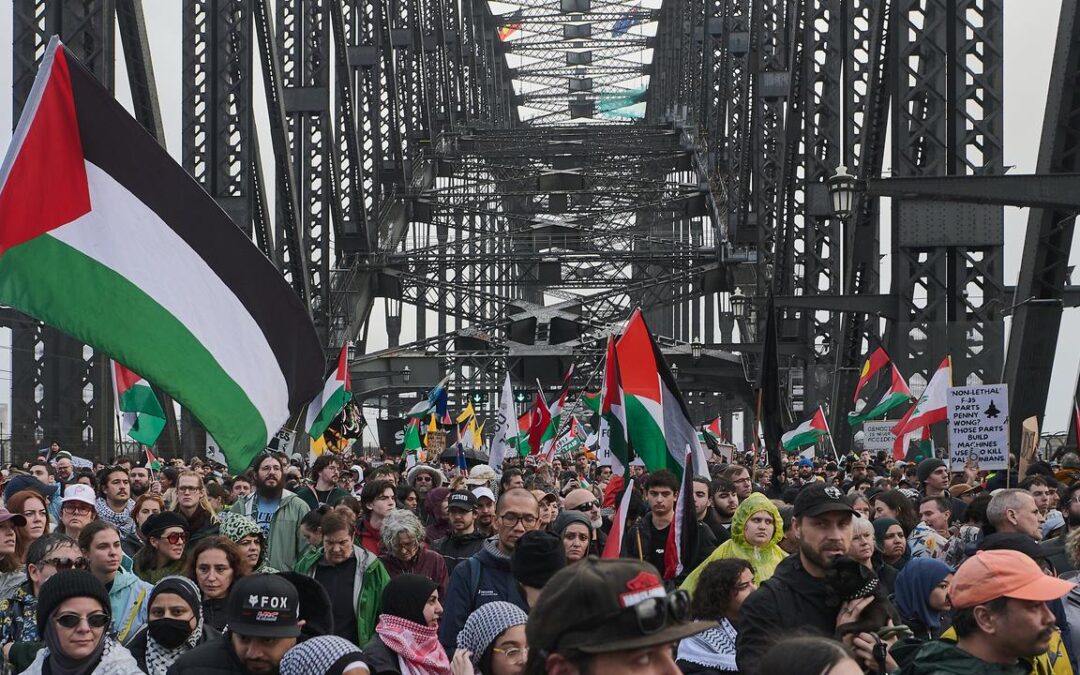
‘Dam has burst’: Palestine support swells before march
Hundreds of thousands of Australians are expected to march in a nationwide groundswell of support for the Palestinian cause, days after famine was declared in Gaza for the first time.
Marchers, backed by more than 250 community organisations, unions and prominent public figures will turn up at rallies in more than 40 cities on Sunday to demand sanctions and an end to Australia’s arms trade with Israel.
“The movement is the biggest it’s ever been,” Palestine Action Group’s Sydney spokesman Josh Lees told AAP.
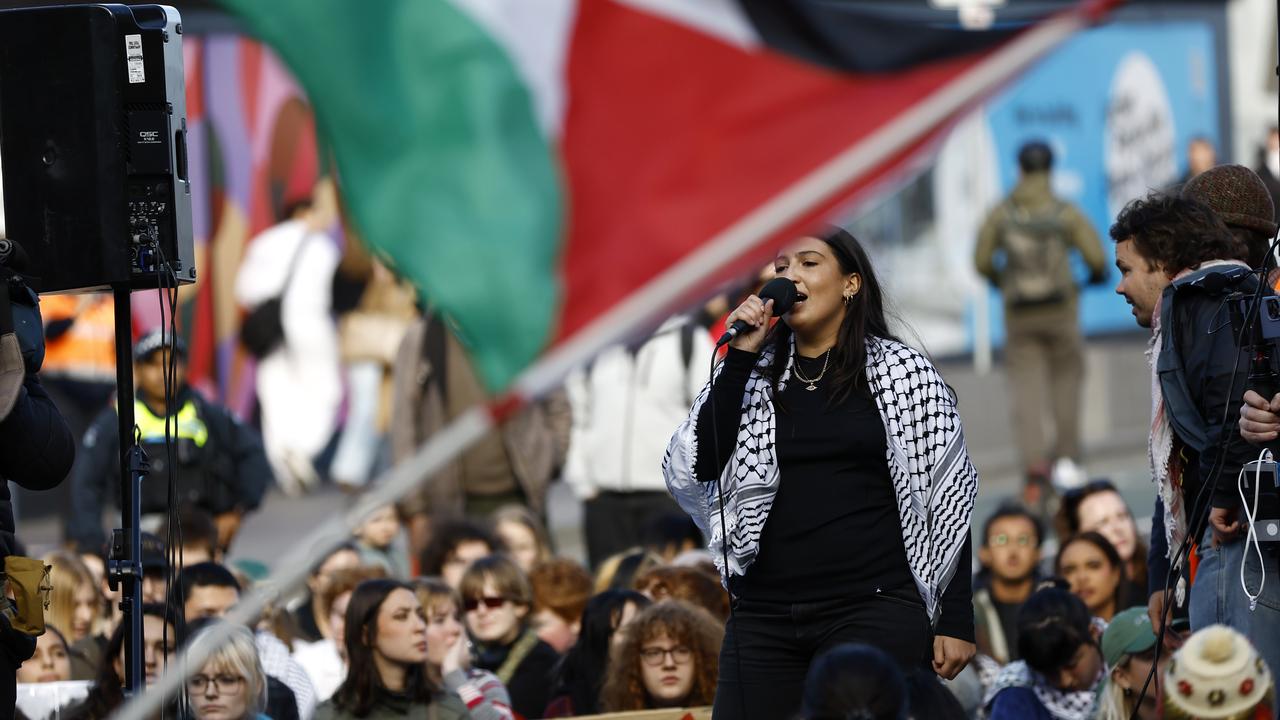
Organisers are anticipating up to half a million people to turn out, up from the estimated 300,000 that attended the Sydney Harbor Bridge march in early August, which they say was a reflection of the huge outpouring of support for Palestinians.
“That bridge march has generated so much momentum around the country,” Mr Lees said.
“The dam has burst in terms of support for Palestine and opposition to this genocide.”
The action comes days after the United Nations confirmed famine in parts of the Gaza Strip for the first time, as Israel prepares for a military takeover of the entire city.
“It adds even more to the urgency of why we need to mobilise to demand our government takes real action to stop this,” Mr Lees said.
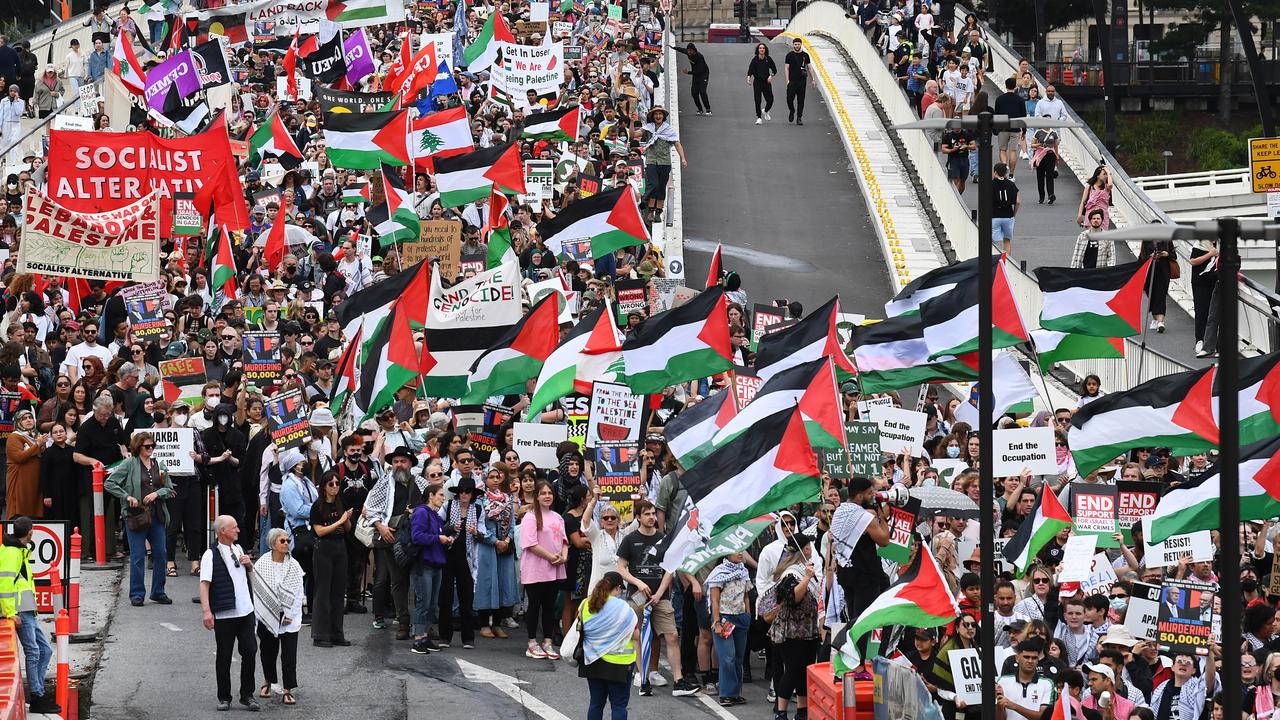
More than 60,000 Palestinians have been killed including 18,000 children since October 7, 2023, when Hamas killed 1200 people and took more than 200 hostages at an Israeli music festival, according to the United Nations.
Speakers slated to address crowds include high-profile activist Grace Tame and journalist Antoinette Lattouf.
The push for change comes after a magistrate vetoed plans by organisers to march across Brisbane’s Story Bridge, which Queensland Police Acting Assistant Commissioner Rhys Wildman welcomed but said could have been resolved weeks ago.
Organiser Remah Naji said the rally would still proceed, starting at Queens Gardens in the city centre and follow an agreed alternative route on Victoria Bridge.
Israel has rejected its actions in Gaza amount to genocide, a claim that has also been brought against it before the International Court of Justice, and its Prime Minister Benjamin Netanyahu called the famine declaration an “outright lie”.
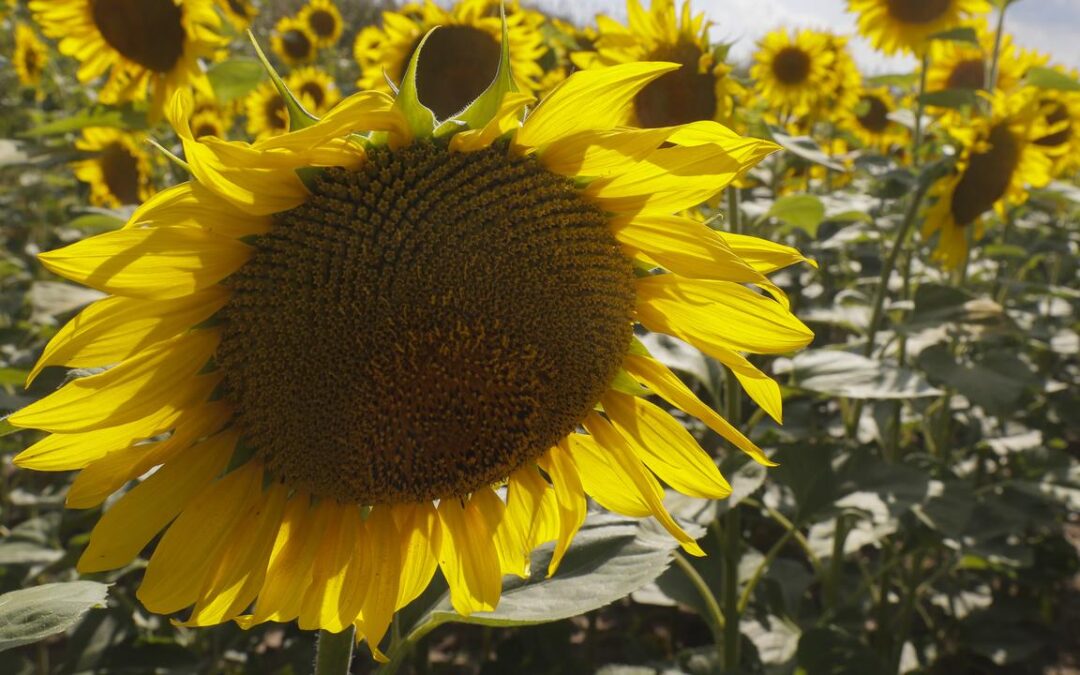
Farming, a lifeline for Ukrainians in war-scarred towns
War victims in parts of Ukraine devastated by Russian occupation are growing hope for the future thanks to a project that provides greenhouses and seeds.
Small-scale farming has become a lifeline for residents of Ukrainian villages devastated by Russian occupation, where unemployment, damaged infrastructure, and mine contamination still linger three years after liberation.
“Just recently, I couldn’t have imagined knowing so much about growing cucumbers and tomatoes,” said Meriam Yol, who now leads the NGO Volonterska in Kharkiv.
Behind the counter of Warehouse Seven, a popular youth spot in the city, Yol displays fresh vegetables, cheeses, and seasonings such as basil- and dill-infused salt.
The produce comes from territories once under Russian control and liberated in Ukraine’s September 2022 counteroffensive.
The Deoccupation Store supports residents of these villages, where life remains precarious with fighting still raging only 20km away.
In Studenok, a village near the frontline districts of Izyum and Donetsk, residents who once worked in the resorts of nearby Svyatohirsk were left jobless after the invasion.
Homes and roads were destroyed, severing economic ties.
“At first, we delivered basics like food or clothes,” Yol said.
“But we realised it’s important to help locals sustain themselves again.”
With backing from donors, the NGO purchased greenhouses and seeds, enabling villagers to grow tomatoes, peppers, and cucumbers for sale.
In her garden, farmer Yulia Korchma shows a small pond, actually a crater left by a shell explosion, as boxes of harvested vegetables are loaded into a van.
“My family has lived here for generations,” she said.
She returned home soon after the Russians withdrew, restoring her land despite the risk of unexploded shells and anti-personnel mines, known as petal mines, that can maim with a single misstep.
While minefields make traditional farming dangerous, greenhouses provide a safe and vital alternative.
Inside, rows of peppers and cucumbers flourish.
Each week, dozens of crates of vegetables are shipped to Kharkiv, with sponsors covering transport costs to keep produce affordable while ensuring farmers earn a modest income.
Deliveries are sorted at the Bagazh marketing school, where classrooms double as storerooms before products reach restaurants or the Deoccupation Store.
Though Russian advances have again forced some locals to flee, the program keeps hope alive for those determined to stay.
“This year, I am growing sweet potatoes for the first time. Next year, I want to try asparagus,” Korchma said.
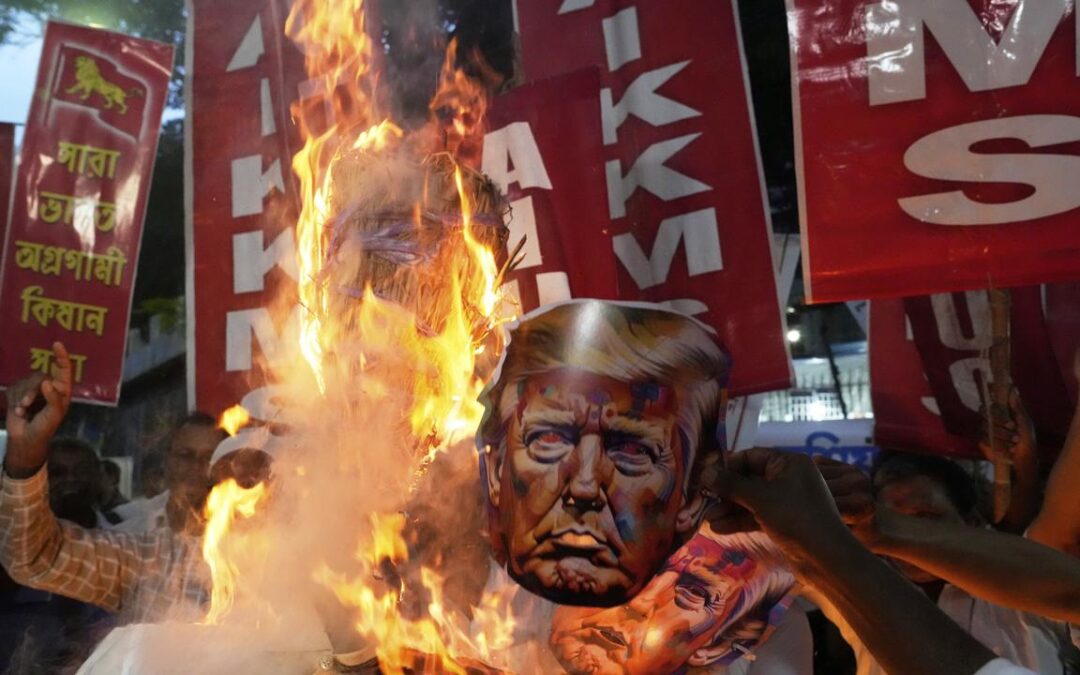
India to defend ‘red lines’ as fresh tariffs loom
India’s trade negotiations with Washington are continuing but there are lines that New Delhi needs to defend, the country’s foreign minister says, just days before hefty additional US tariffs are due to hit.
Indian goods face additional US tariffs of up to 50 per cent, among the highest imposed by Washington, due to its increased purchases of Russian oil.
A 25 per cent tariff has already come into effect, while the remaining 25 per cent is set to be enforced from August 27.
A planned visit by US trade negotiators to New Delhi from August 25-29 has been called off, dashing hopes that the levies may be lowered or postponed.
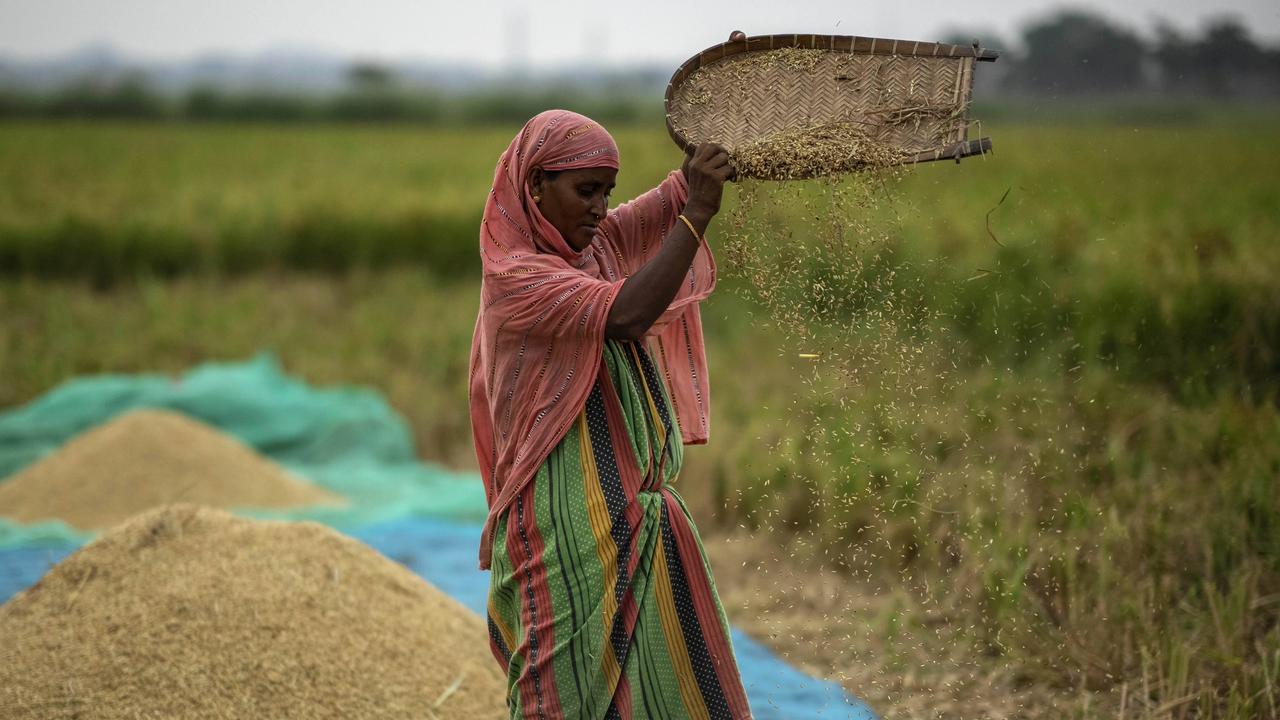
“We have some red lines in the negotiations, to be maintained and defended,” Indian Foreign Minister Subrahmanyam Jaishankar said at an Economic Times forum event in New Delhi, singling out the interests of the country’s farmers and small producers.
India-US trade talks collapsed earlier in 2025 due to India not agreeing to open its vast agricultural and dairy sectors.
Bilateral trade between the world’s largest and fifth-largest economy is worth more than $US190 billion ($A293 billion).
“It is our right to make decisions in our national interest,” Jaishankar said.
Analysts at Capital Economics said on Friday that if the full US tariffs came into force, the hit to India’s economic growth would be 0.8 percentage points both in 2025 and 2026.
“The longer-term harm could be even greater as a high tariff could puncture India’s appeal as a global manufacturing hub.”
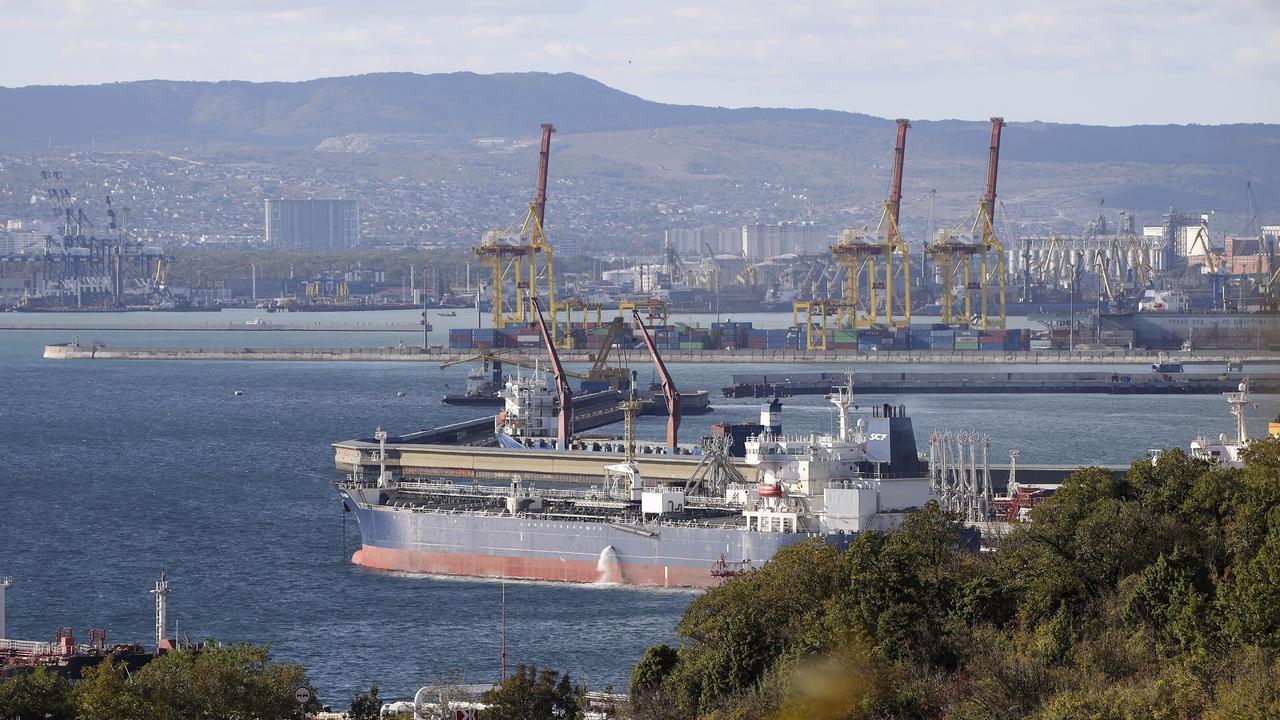
The Indian minister described US President Donald Trump’s policy announcements as unusual.
“We have not had a US president who conducts his foreign policy so publicly as the current one and (it) is a departure from the traditional way of conducting business with the world,” Jaishankar said.
He also said Washington’s concern over India’s Russian oil purchases was not being applied to other major buyers such as China and European Union.
“If the argument is oil, then there are (other) big buyers. If argument is who is trading more (with Russia), than there are bigger traders,” he said.
Russia-European trade was bigger than India-Russia trade, he said.
The minister also said India’s purchases of Russian oil had not been raised in earlier trade talks with the US before the public announcement of tariffs.